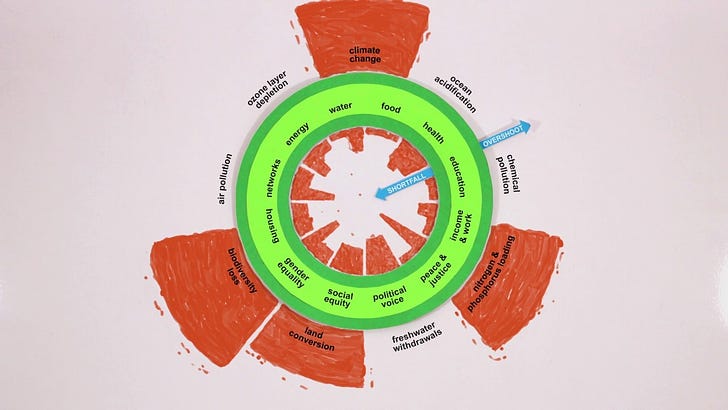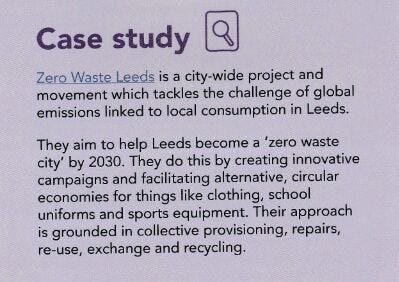How can Leeds thrive, whether or not the economy grows?
I’ve recently been re-reading Doughnut Economics, to help me think through a few things relating to where we want to take things next with…
I’ve recently been re-reading Doughnut Economics, to help me think through a few things relating to where we want to take things next with Zero Waste Leeds.
I picked it up again this week as I noticed that Kate Raworth will be talking at an event next week in Leeds, hosted by the Council, on inclusive growth.
If you’ve read Doughnut Economics, or if you’re interested in how we respond to the climate crisis, you’ll quickly identify one of the key questions that may come up at an event about inclusive growth where Doughnut Economics is being discussed:
How can Leeds thrive, whether or not the Leeds economy grows?
I need to honest. I haven’t engaged deeply with the work that’s taken place to date in Leeds on inclusive growth. I try my best to engage as much as I can with what’s going on the city, but there often just isn’t time to get involved in everything, either through work or in my spare time.
But when I went along to the launch of the strategy in 2018, my concern was mostly around how little emphasis was placed upon issues relating to the climate crisis. A few years on, post Climate Emergency declaration, I felt the same.
It may well be that things have moved on, and that the Inclusive Growth Strategy is now much more aligned with work that’s taking place in the city — led by the Council — in response to the Climate Emergency. I imagine we’ll find this out next week.
Either way, Doughnut Economics offers us an important challenge. One that’s uncomfortable to explore, particularly at a time when increasing numbers of people in our city are being pushed into poverty.
What if the Leeds economy didn’t keep growing?
Or perhaps, what if we judged success in different ways, counted different things?
What if we changed the goal?
I am sure people championing Inclusive Growth in Leeds will point out that the whole point of the Inclusive bit is that it’s about other things alongside economic growth.
And I have no doubt this is true, and that the desire to have a wide range of positive impacts on the city and its people is strong and sincere.
And discussions this week about a Social Progress Index at the council’s Infrastructure, Investment & Inclusive Growth Board sound promising. As the report discussed at the meeting outlines:
There is a growing awareness that we must go beyond Gross Domestic Product (GDP) and economic statistics to get a fuller understanding of how society is doing. City strategies and rankings systems have typically measured economic success in terms of standard economic metrics such as output growth (Gross Value Added), employment and business start-up rates. These indicators are inadequate if we are interested in inclusive growth because they give no indication of the distribution of the monetary and non-monetary benefits of economic activity.
You can listen in to the discussion at the meeting here (it starts at around 1hr 13mins).
I watched the half-hour discussion earlier today (What a step forward it is to have meetings streamed online (and which you can watch at double speed)).
I’ll need to reflect more on what‘s being proposed, and perhaps find out more next week — but it seems clear that the point of the Social Progress Index is (as you might expect, given its name) to give a broader perspective on how things are for people living in our city. Things that a purely economic measure will ignore.
This is very welcome — and much more valuable than purely economic indicators.
But what about the environmental impacts of everything we do in Leeds?
It’s great that we’re going to look more holistically at the broad experience of what it’s like to live in Leeds and how growth may be influencing, positively or negatively or not at all - on those experiences. But do we not need to consider how all the economic activity in the city is impacting on our ability to thrive within planetary limits?
That is the central argument of Doughnut Economics. Perhaps this will get explored more next week — it could well be exactly why Kate Raworth has been invited along.
I want to be clear. This stuff is really challenging. It’s made all the more challenging by the context of 12 years of austerity, and a “levelling-up” strategy that appears to offer little more than empty words.
But we have to keep asking ourselves these questions.
How can the people of Leeds thrive, whether or not the Leeds economy grows?

And how do we thrive within planetary limits, as outlined so comprehensively in the Yorkshire and Humber Climate Action Plan?
Update — 27 January 2022
If you’re interested in helping Leeds to explore these ideas more, Climate Action Leeds are currently recruiting for a City Plan Lead:
“….to conduct research and analysis, develop policy insights and support the logistics of a City Plan and planning process. This work will be based around the groundbreaking ideas of Doughnut economics, the Doughnut Economics Action Lab (DEAL) network and the recently formed Leeds Doughnut Coalition.”
You can find out more about the role, and apply, here. Closing date is 17th February.
Update — 4 May 2022
On 28 April Climate Action Leeds published The first Leeds Doughnut City Portrait — taking Doughnut Economics as inspiration to explore how we can create “a safey and thriving city for all.”
You can find out more, and read the summary report, here.




